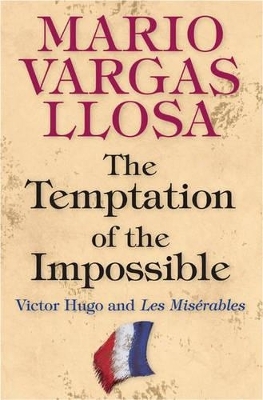
The Temptation of the Impossible
Princeton University Press (Verlag)
978-0-691-13111-5 (ISBN)
It was one of the most popular novels of the nineteenth century and Tolstoy called it "the greatest of all novels." Yet today Victor Hugo's Les Miserables is neglected by readers and undervalued by critics. In The Temptation of the Impossible, one of the world's great novelists, Mario Vargas Llosa, helps us to appreciate the incredible ambition, power, and beauty of Hugo's masterpiece and, in the process, presents a humane vision of fiction as an alternative reality that can help us imagine a different and better world. Hugo, Vargas Llosa says, had at least two goals in Les Miserables--to create a complete fictional world and, through it, to change the real world. Despite the impossibility of these aims, Hugo makes them infectious, sweeping up the reader with his energy and linguistic and narrative skill. Les Miserables, Vargas Llosa argues, embodies a utopian vision of literature--the idea that literature can not only give us a supreme experience of beauty, but also make us more virtuous citizens, and even grant us a glimpse of the "afterlife, the immortal soul, God."
If Hugo's aspiration to transform individual and social life through literature now seems innocent, Vargas Llosa says, it is still a powerful ideal that great novels like Les Miserables can persuade us is true.
Mario Vargas Llosa is a prolific novelist and essayist whose literary criticism includes "A Writer's Reality, Letters to a Young Novelist", and studies of Flaubert and Gabriel Garcia Marquez. One of his books of essays, "Making Waves" (Penguin), won the National Book Critics Circle Award. His novels include "Aunt Julia and the Scriptwriter, The Notebooks of Don Rigoberto", and "The Feast of the Goat". Born in Peru, he now divides his time among Lima, London, and Madrid.
Acknowledgments xi Introduction: Victor Hugo, the Ocean 1 Chapter I. The Divine Stenographer 11 Chapter II. The Dark Vein of Destiny 34 The Law of Chance or the Order of Coincidence 34 The Irresistible Traps 41 The Ambush in the Gorbeau Tenement 43 The Barricade at la Chanvrerie 45 The Paris Sewers 47 Elusive Freedom 52 Chapter III. Touchy Monsters 56 A Character without Qualities 57 The Saint 61 The Just Man 65 A Puritan World 70 The Fanatic 75 An Angel with a Dirty Face 80 Collective Characters 84 Chapter IV. The Great Theater of the World 87 Adjectives to Describe the Show 89 Performance, Beauty, and Life 92 Light and Shadow 95 Sets 96 The Victor at Waterloo 97 Human Putrefaction 98 Life as Fiction 102 Chapter V. Rich, Poor, Leisured, Idle, and Marginal 105 Reformist Idealism 110 The Just 114 A Society Rebuilt 118 The Victims: Confinement and Women 120 A Source of Social Injustice: The Law 122 A Stupid and Cruel Monster 124 Chapter VI. Civilized Barbarians 131 Long Live Death! 132 Slow-Motion Progress 134 Victor Hugo and the Insurrection of 1832 138 Chapter VII. From Heaven Above 146 The Enumeration of the Infinite 148 Attempting the Impossible 154 The Total Novel or the Deicidal Impulse 156 Chapter VIII. The Temptation of the Impossible 165 Notes 179 Index 185
| Erscheint lt. Verlag | 23.4.2007 |
|---|---|
| Übersetzer | John King |
| Verlagsort | New Jersey |
| Sprache | englisch |
| Maße | 140 x 216 mm |
| Gewicht | 340 g |
| Themenwelt | Geisteswissenschaften ► Sprach- / Literaturwissenschaft ► Anglistik / Amerikanistik |
| Geisteswissenschaften ► Sprach- / Literaturwissenschaft ► Literaturgeschichte | |
| Geisteswissenschaften ► Sprach- / Literaturwissenschaft ► Literaturwissenschaft | |
| Geisteswissenschaften ► Sprach- / Literaturwissenschaft ► Romanistik | |
| ISBN-10 | 0-691-13111-2 / 0691131112 |
| ISBN-13 | 978-0-691-13111-5 / 9780691131115 |
| Zustand | Neuware |
| Haben Sie eine Frage zum Produkt? |
aus dem Bereich


